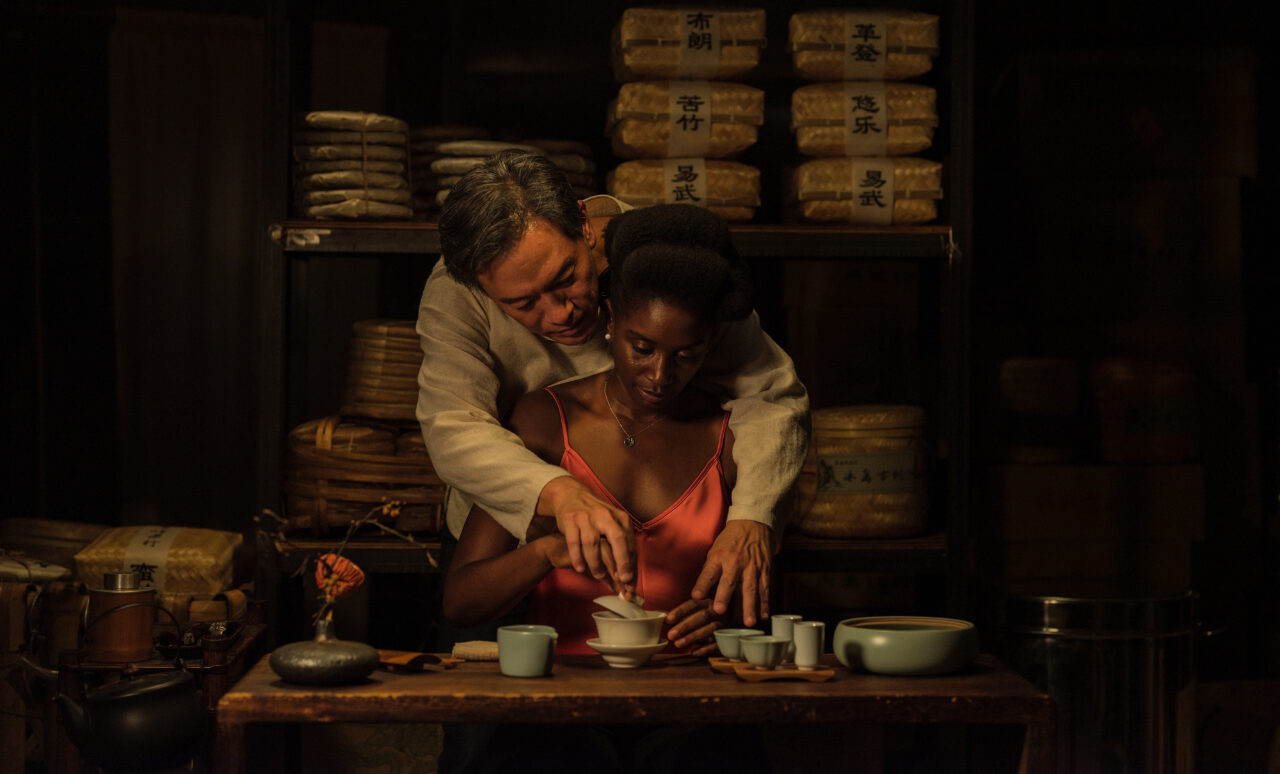“My main concern is the story I’m telling – not the place where it takes place”: Abderrahmane Sissako on Black Tea at Berlinale 2024

The gentle rhythms of Black Tea might make the film too laid-back for some audiences, although its cross-cultural love story could give it crossover appeal. Director Abderrahmane Sissako’s work is an interestingly reserved choice for the Berlinale’s illustrious competition section, and we spoke to the filmmaker backstage at this year’s festival. Black Tea tells the story of Aya, (Nina Mélo) a young woman from Côte d’Ivoire who finds acceptance in Chocolate City, a district of Guangzhou popular with African migrants. Despite the feature being almost entirely set in the Chinese city, not a single frame of footage was shot in the country.
It’s like you’re trying to develop a type of utopia for migrants in Black Tea. Is this a realistic depiction of African expats in China?
I believe that it’s not so much a utopia, in my opinion, it’s maybe a wish for different worlds to be able to meet and grow together. The world we live in; our planet is made of different entities, and it’s made of different, permanent and constant encounters of different people that make mankind, that make humanity, and that’s how mankind was built. Nowadays of course, we live in a more developed world – and not only in the Western world, but also in Africa and in Asia, and our world is more and more global. And as for the relationship between Africa and China, they (Africans in China) have been there for some time. They’re not new. And as for my choice of China and Africa, there are cinematic reasons of course, but also my protagonist Aya is a free woman – she is, you know, of course making her own decisions against society and these rules of the society that she lives in. She’s determined to leave, and when she lands in China she meets other women as free as she is.
As Aya, Nina Mélo acts in French, English, but mostly in Mandarin. Did you look for an African actress who could speak Mandarin or did you approach it from the other direction – casting the right actress and getting her to learn the language before shooting started?
I travelled in China extensively for three years and I met young African women who were able to speak the language, and my first casting went in that direction. I tried to look for the perfect interpreter for the role, but I soon realised that I’d better find a very good actress who is able and experienced, and able to take on this very difficult and heavy task of not only being able to play the character, but also to play the language. She didn’t learn it, she just worked with a coach in order to be able to act the language, to pronounce it in the correct way, and I’m happy about my choice. And the fact of choosing a professional actress also allowed me to distance myself from this sort of documentary take on Chocolate City, because that’s a reality – those communities are there, and I wanted to be able to dive into fiction in order to portray that reality.
You show Guangzhou as a cultural melting pot. Is this how the city really is, or did you create this atmosphere for the film?
Guangzhou is the factory of the world, so to speak. It’s where most international trade takes place, and there are not only African communities, but also Middle Eastern and communities of the Arab world are very present there. There are not so many people from South America, but there is also a community of Africans. Europeans are not so present there and Chocolate City exists; it’s a neighbourhood, a district made of small tradesmen. They buy thousands of items and they carry out their own small trades, and it’s a very lively community and it’s a beautiful area of Guangzhou. You know it’s got a very strong identity and a lot of humanity, you can live and breathe, and there is a resemblance between African people and Chinese people in that respect.
Did you visit China to research the film?
I had the film in mind for a long time before I travelled to China. It’s a subject I had in mind since 2007, or even earlier perhaps since 2001, when in Heremakono (Waiting for Happiness, directed by Abderrahmane Sissako) where an African woman dines with a Chinese man. And to me, it describes the reality of Chocolate City very well. In the film, when they say it’s going to disappear, and it sort of is, because Chinese people are going to Africa, and so they no longer need the African people to go and do business in their own country.
Although most of the film was set in China, these sequences were entirely shot in Taiwan. What’s the reasoning behind this decision?
To me, this is not a problem. Cinema is fiction and although it portrays an actual world it is still fictional and I can understand that Taiwanese might have a problem with the accents (in the film), but that is not – or probably not – the only problem that they will have. They will also wonder why a film set in China is actually shot in Taiwan, but to me, this is not a problem at all. When I shot Timbuktu (Sissako’s 2014 movie), it was not in Timbuktu. We shot it in Mauritania, but that is cinema, you know? It’s a cinematic art and freedom in a way, to me, my main concern is the story that I’m telling – not the place where it takes place. It doesn’t need to be the actual place. What is important is to be able to prompt emotions, and I know very well that Taiwan is not Guangzhou. The reason why most of the film is shot at night is a statement that I’m quitting reality, and that I’m telling you something else.
Did you consider shooting in China?
China said no. It’s as simple as that. After nine months of waiting, after this refusal – it was 2019 at that point, when we went to Taiwan as another option. Because when you are denied to do something, you have the freedom of setting it up somewhere else. Of course, I had to adapt it to the reality of the Taiwanese landscape.
Your feature makes a statement about racism against African migrants in China. Is this level of racism a fact of everyday life for migrants in Guangzhou?
Racism is everywhere: it means refusing the other, refusing and fearing other people and not being willing – or not wanting to know them better. It’s in all countries, not only in European countries vis-à-vis people coming from other continents, but also Egyptians can be racist towards Tunisians, for instance. It’s inside different continents and hopefully, as we see in the film, the new generation will open up their minds and accept other people more easily – as Li-Ben (a character in the film), whose stance is against his grandfather and his discourse. China is a country that has been locked up for many centuries, and it is now evolving, and also societies are evolving, and when they do so they open up to a new reality. Taiwan is quite impressive. The African Community actually living in Taiwan are happy because of the total lack of racism that is there. They say it’s wonderful, people are always very, very kind, it’s a very open society.
Oliver Johnston
Black Tea does not have a UK release date yet.
Read more reviews from our Berlin Film Festival 2024 coverage here.
For further information about the event visit the Berlin Film Festival website here.


























Facebook
Twitter
Instagram
YouTube
RSS